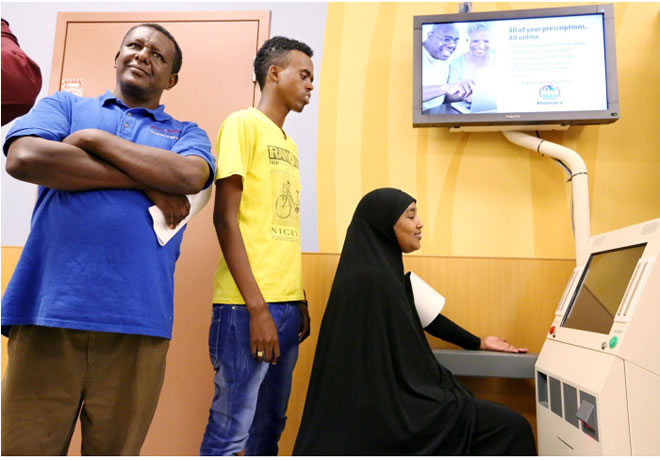
By Encarnacion Pyle
Monday, August 24, 2015

Luul Osman sits at a blood-pressure machine in the pharmacy at the Kroger store on Morse Road. She joined Eshetu Roba Abdi, left, and Deqene Ali on the tour offered by a student association at Ohio State University and a resettlement group.
Kroger pharmacist Ben Michaels can’t believe that a Bhutanese refugee once watched customers drop off and pick up prescriptions for more than two hours before getting the courage to ask for help.
“I still remember being told the story and feeling so bad. If only we had known,” he said.
In many refugee camps, refugees will see a doctor and receive medication at the same time, which is why “this poor man was so confused when he walked into our store,” Michaels said.
The man eventually found another Nepali speaker in the store to accompany him to the counter.
To spare others from similar frustrations, students at Ohio State University now offer pharmacy-orientation classes to newcomers in the U.S.
“Community pharmacists are the health professionals most accessible to the public,” said Hyun-Su Helen Kim, a pharmacy fellow at Ohio State.
Kim and another OSU student created the orientation with help from the Morse Road Kroger two years ago as part of a program aimed at helping community pharmacies better serve customers. After learning about the large immigrant and refugee population in the area, Kim and her partner decided to focus on their challenges.
“We wanted to help these new residents feel comfortable walking into a pharmacy, dropping off a prescription and asking questions about their symptoms or medications,” Kim said.
After she and her partner graduated last year, the university’s Student National Pharmaceutical Association adopted the program to keep it going. About 60 refugees have gone through the orientation.
The U.S. health-care system is confusing and daunting to most new immigrants, said Laura Smith, an employment specialist with US Together, one of three resettlement groups in Columbus. That’s especially true if they’ve come from war-torn countries or have lived in refugee camps for years.
“Imagine adapting to a new country, new language and a new life where everyday tasks such as taking a bus or going grocery shopping can be overwhelming,” she said.
Many don’t know the difference between a physician and a pharmacist or between over-the-counter and prescription medications, Smith said.
The students gain as much from the interaction as the refugees do, said Jennifer Rodis, assistant dean for outreach and engagement at OSU’s College of Pharmacy. “Our students are often pushed out of their comfort zones and learn a little about different backgrounds, cultures and countries. It’s a very empowering experience.”
Once or twice a month, US Together drives a small group of new refugees, from such places as Bhutan, Iraq and Somalia, to the Morse Road Kroger for orientation.
Last week, a refugee from Ethiopia who knows some English and three people from Somalia who had the assistance of an interpreter attended the program. None had been in the U.S. more than two months.They learned about pharmacy services, the different types of medication and how to read a prescription label.
They talked about why they might get refills with some medications and why they should never share their prescription medicines. And they discussed Kroger’s interpretation services, how insurance works and why they might get billed for some medications.
“Over-the-counter medication, you’ll have to pay out of pocket because insurance doesn’t cover them,” Natalie Fiorilli, a third-year pharmacy student from Cleveland, told the group.
She handed out a picture chart describing some common symptoms, such as coughing and sneezing, and showed the group some different medicines they might use for each.
“If you have a cough — ‘ Ak! Ak!’ — you might want to try Tussin DM,” Fiorilli said while pretending to have a hacking cough. She then showed a bottle of ibuprofen, saying it would be good for a headache, toothache or other minor pain.
“These are just some examples,” Kim said. She often helps out with orientations.
“There are other medications you can take for these conditions, so it’s good to talk to a pharmacist to get some guidance and to make sure you’re taking the right kind of medication for your symptoms.”
Luul Osman, a 35-year-old mother of three from Somalia, asked if children should take the same over-the-counter drugs as adults. Fiorilli told her to look for the word children on the box and to read the instructions to find out what ages can take the medicine and how much to give.
The group also toured the pharmacy, with the students pointing out the drop-off, waiting and pickup areas as well as where over-the-counter medications can be found. But the highlight for the refugees was learning how to use the blood-pressure machine.
“What does this mean?” asked Ali Mohamed, a 26-year-old man from Somalia with a puzzled look on his face.
“Your blood pressure is 106 over 79,” said Mukti Dahal, an employment specialist with US Together. “That’s normal.”
“I’m good!” Mohamed said, visibly relieved.